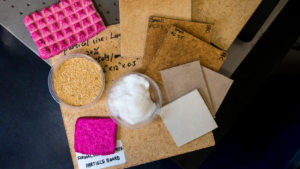UMaine Researcher Wins $250k to Advance Wood-based Building Materials

Prototypes of products made from wood nanocellulose at the University of Maine include an alternative to traditional drywall, formaldehyde-free particle board, and a scratch-, fire-, and water-resistant flooring system. (Photo courtesy of the University of Maine)
Mehdi Tajvidi, assistant professor of renewable nanomaterials at the University of Maine’s School of Forest Resources, was just awarded $250,000 to develop next-generation wood-based building materials.
Called cellulose nanofibrils (CNF), these building materials are the natural structural building units of wood that are 1/100,000th the width of a human hair. New research from Sweden has discovered that CNF is stronger than spider silk—previously thought to be the strongest biobased material in existence.
Dr. Tajvidi “describes CNF as magical,” according to the University of Maine. “The renewable biodegradable material has superior properties, he says, including exceptional strength and ability to bond.”
The university reports that Tajvidi was awarded the $250,000 grant from P3Nano, a public-private partnership founded by the U.S. Endowment for Forestry and Communities and the U.S. Forest Service, to develop next-generation CNF building materials.
Already, Dr. Tajvidi has developed innovative prototypes for products made from CNF, including an alternative to traditional drywall, formaldehyde-free particle board, and a scratch-, fire-, and water-resistant flooring system.
Product commercialization would lead to jobs and improved forest health, according to the university. The University of Maine also writes: “Maine mills could be modified to handle production, says Tajvidi, who adds that he has numerous other ideas of how to utilize the magic of CNF in a variety of other products.”
Learn more about Dr. Tajvidi’s exciting research at the video below:
